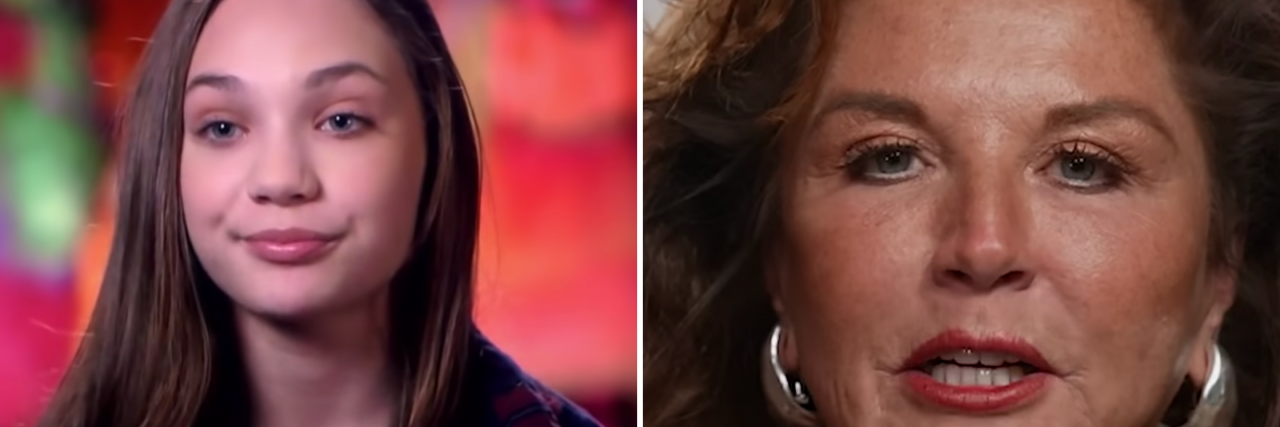The world watched Maddie Ziegler grow up on the hit reality show “Dance Moms,” and since leaving the show in 2016, the dancer and actor has appeared in music videos (notably, Sia’s “Chandelier” video), movies (she had a controversial role in Sia’s “Music” and most recently a role in “West Side Story”), and she even has a podcast with her sister.
When Ziegler looks back to the time of her life that launched her into the public eye, though, she refers to the experience as “toxic.” She discussed how she feels about her “Dance Moms” past in a new interview with Cosmopolitan.
When asked about the stress she experienced on the show, she said:
“The pressure of being known as, ‘Oh, she’s the girl that always wins,” then to not win or to have another girl beat me was the end of the world. Because that’s what I was taught: to not win or to have another girl beat me was the end of the world. My dance teacher taught that if you don’t get the trophy, if you don’t get the crown, you are less than, which is the worst way to train a kid. It carries into other life lessons. We also weren’t allowed to watch our competitors or be friends with them. I’ve had to unlearn a lot of those things.”
After realizing they’d be more at peace if they left the show and lived away from the cameras and the drama of reality TV, she and her mom struggled to get out of their contract. When they finally did, now infamous “Dance Moms” coach Abby Lee Miller was not thrilled to say the least. Ziegler revealed she actually no longer speaks to Miller, who according to the interview, was notorious for yelling at kids on the show and has “spent her post–Dance Moms career embroiled in legal and financial woes.”
“She was distraught. For the longest time, we felt so guilty. She trained me, she helped me, but also, I knew I would be okay without her and I was sick of being in a toxic environment. I was like, ‘This is not for me. I can’t do this.’ I haven’t spoken to her since.”
Since the interview launched, Miller responded on her YouTube channel. “If it was so toxic, why did you keep doing it?” she said, defending her role in Ziegler’s life. In the video, she claims she never explicitly told Ziegler she was “less than” for not winning, and that Ziegler had a choice every step of the way. (A reminder that Ziegler was 8 years old when the show started.)
Going “no contact” with someone who was toxic to you is hard, and I imagine doing so with someone who you were on a nationally syndicated television show with for the world to see is even harder.
I believe there’s a lot we could learn from Ziegler when it comes to protecting our peace and going “no contact” with people, places, jobs, etc.
1. Don’t check up on them, even when curiosity strikes.
Ziegler revealed that she hasn’t revisited that time of her life at all. This includes rewatching episodes (showing her boyfriend part of an episode so he could see what she looked like was a quick exception) and talking to Miller.
Sometimes when we leave toxic relationships, places, or people, we get the urge to check up on them and see what they’re up to. Don’t do it. Don’t reopen the wound. Let the past stay in the past, process it in the present, and hope to move on and heal in the future.
2. It’s OK to explore parts of yourself that you couldn’t before going “no contact.”
Control is a huge factor in toxic relationships, and that means there may be parts of yourself you didn’t feel comfortable exploring and expressing prior to going “no contact.”
For Ziegler, it was being anything less than “perfect,” which for a dancer means perfect lines, pointed feet, etc. Through working with other artists, she allowed herself to explore more “flawed” dancing styles which ultimately helped her discover new passions she otherwise wouldn’t have known.
Challenge what you were told not to do, whether it’s with your emotions, hobbies, activities, or even your professional life. You never know what you may learn about yourself.
3. It’s OK to acknowledge the good times, even in the dark memories.
Towards the end of her conversation with Cosmo, Ziegler was asked if she would unpublicize any part of her life if she could. She answered she would not — that there were still good memories, and she wanted to keep those.
When we experience something traumatic or toxic, it’s easy to be bitter and resentful towards even the good things you remember. Sometimes I personally wish I didn’t remember the good at all, but I do because it was just as real as the abuse and trauma. One doesn’t overpower another, but both experiences can co-exist.
Getty image by Lifetime’s YouTube channel and Abby Lee Miller’s YouTube channel.

